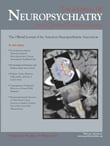Case Report
Mr. B, 35 years old, was diagnosed with paranoid schizophrenia. He presented with acute onset of restlessness, muteness, profuse sweating, and confusion. He was trying to climb the wall, crawling over the floor, making gestures of eating, smoking, and picking up things from the carpet. He dislodged a mirror and a wardrobe door. The psychiatric nurse who visited him at home considered it a hypoglycemic episode and called an ambulance. Blood glucose was normal. Due to his agitation, he was taken involuntarily to a psychiatric hospital with the assistance of the police. Physical examination was impossible, as he uncharacteristically required restraining, and intramuscular haloperidol and lorazepam were administered.
The next morning Mr. B had a normal mental state but a very partial recollection of the previous day. Physical examination was normal, with no muscle rigidity or fever, but his creatine phosphokinase level was 10,844 I.U./liter (normal=24–180), white cell count was 16.5 Í10 9 cells/liter (normal=4–11) and neutrophils were at 13.2 Í10 9 cells/liter (normal=2–7.5). The patient refused EEG, but an ECG was normal. We made a provisional diagnosis of NMS and suspended his treatment with antipsychotics; we maintained hydration, and proceeded with serial blood work. The creatine phosphokinase level returned to normal by day 8, and the white cell count returned to normal in 3 weeks. He remained free from psychotic symptoms for more than a month, having previously had significant symptoms continually, despite medication.
Treatment with clozapine had been stopped after 5 years when he developed frank diabetes. The diabetes resolved, but other medications proved insufficient and clozapine was restarted 6 months beforehand. It was cross tapered with his previous medication, but his continual symptoms, and reluctance to stop tablets, meant the process was incomplete, and he remained on quetiapine, 200 mg/day, and zuclopenthixol decanoate tablets, 25 mg/day, in addition to clozapine, 400 mg/day, with no recent changes.
Discussion
The presentation was initially mistaken for relapse and treated with antipsychotics, which fortunately did not aggravate the condition. We diagnosed NMS based on altered level of consciousness, sweating, mutism, raised creatine phosphokinase, and leucocytosis. Mr. B may have had other features of NMS which were short lived and not witnessed.
Neuroleptic malignant syndrome induced by clozapine may present with atypical features including lack of muscle rigidity
1 and fever.
2 It usually occurs after initiation or increase in dose, and rarely when the dose is reduced,
3 but has been reported in patients on steady treatment with clozapine.
4 In this case NMS was of short duration and did not require active intervention.
The possibility of complex partial seizure should also be considered because of the initial presentation and absence of psychotic symptoms after the episode. However, only 3% of reported seizures associated with clozapine are complex partial in nature,
5 there was no past or family history of epilepsy, and seizures are more common when clozapine dose is greater than 600 mg/day.
There may be a subgroup of patients who remain largely clinically asymptomatic for a period of time after NMS. Brown
1 reported a patient who only required occasional doses of antipsychotics after clozapine-induced NMS. Antipsychotics are often restarted on the assumption that the patient will inevitably develop psychotic features. Although most patients who develop NMS will need antipsychotics again, there may be a minority who do not, and given the risks (30% chance of NMS on rechallenge
6 ), it might be important to “wait and see” rather than automatically rechallenging.

